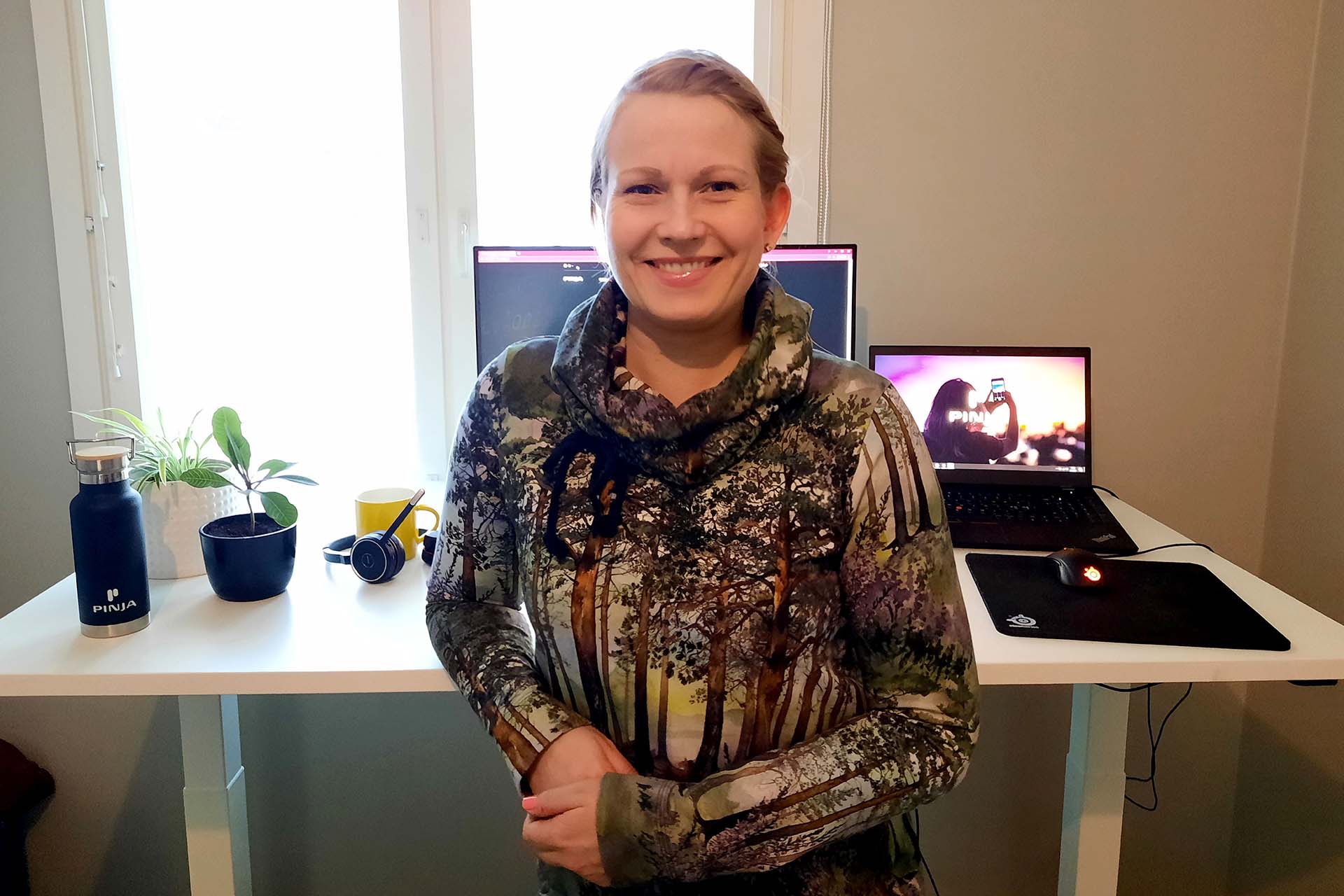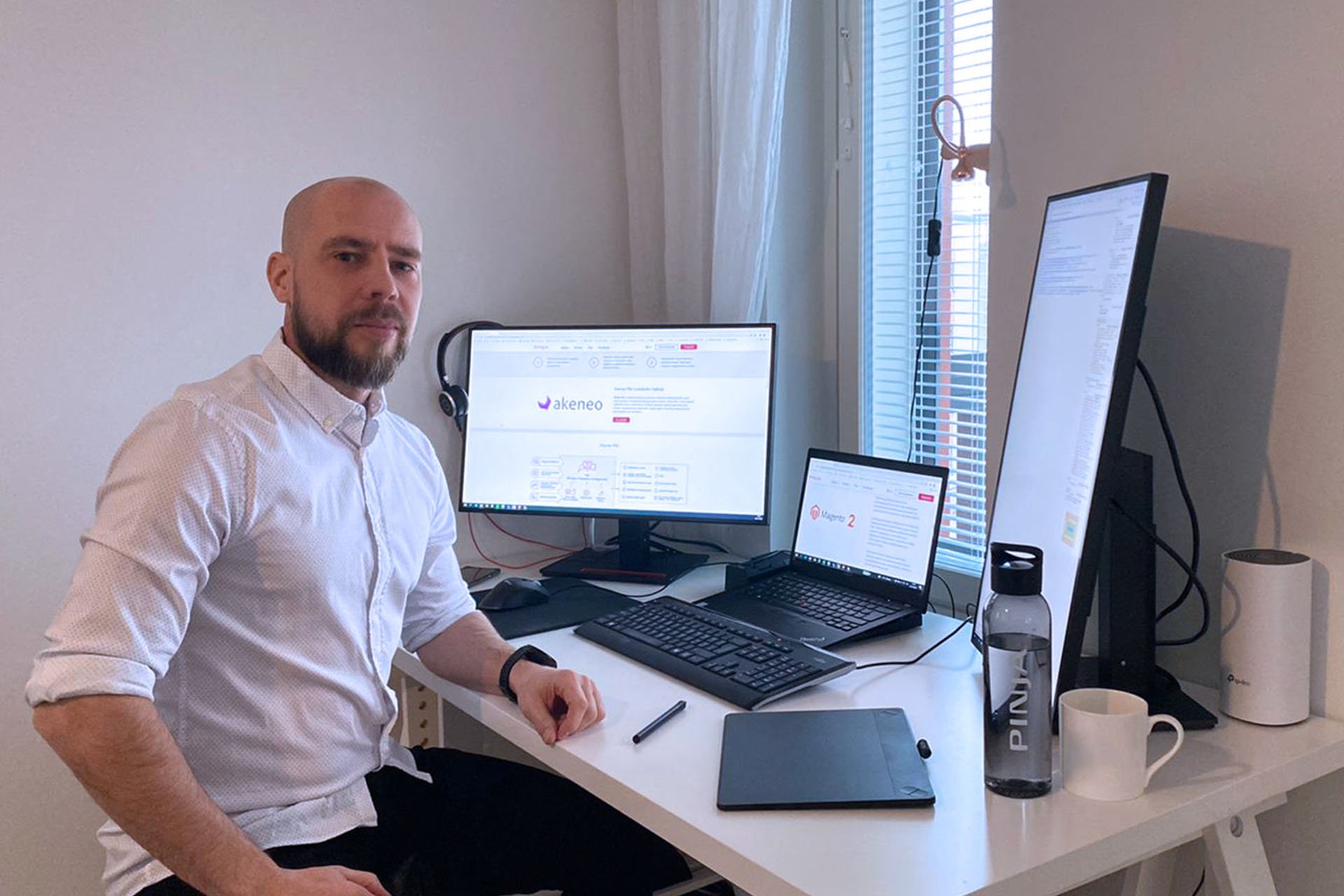
Pinja’s culture includes flexible working. In addition to flexible working hours, most jobs allow you to work from any location. Flexible working is possible because Pinja’s employees are united by customer focus, trust and adherence to mutually agreed practices that ensure teamwork.
Toni works as a Sales Manager at Pinja’s Digital Commerce unit. Toni’s job description includes solution sales, and customer consulting and training. As the work does not tie him to a specific location or require presence, it enabled Toni to move from Oulu to Southern Finland this fall.
Heta Antila moved to Mikkeli from Muurame just over three years ago. Heta’s work as a systems expert and customer service manager for the Muster service has gone very well, even though the other members of the team work in other locations.
The employer made moving easy
Toni was already familiar with Southern Finland, as it was the starting point when he moved to Oulu more than a year ago. An acquisition soon brought new opportunities, and the world events and the Coronavirus changed the plans so much that the idea of returning slowly entered his mind.
The employer made the move as easy as possible for Toni – all the things that couldn’t be carried under the arm were packed in a moving box and sent to the Espoo office in advance.
– I went through my ideas with my supervisor and we decided that I had become familiar with remote work and working methods, and the clients are also used to the fact that meetings are organized remotely. So that didn’t rule out the possibility of being able to move – says Toni.
However, the decision to move back was not a quick one, as moving from the other side of Finland required certain arrangements. The employer made the move as easy as possible for Toni – all the things that couldn’t be carried under the arm were packed in a moving box and sent to the Espoo office in advance.
Toni thinks that it’s extremely good that he started working physically in the Kempele office, where he got to know the Oulu team and his own team members. His own supervisor, project managers and account managers were on site when he started, which helped him get familiar with the work.
Heta and her husband had also been thinking for a long time about whether they should move to Mikkeli with her husband’s work, or whether they should continue to live in Muurame. Two things happened in 2019 that spurred Heta’s decision to move: acquisitions brought office space to Mikkeli and enabled 100% remote working across the group. Heta had raised the topic of moving well in advance, and everything went smoothly from the employer’s side.
– There was time to discuss and think about how to organize the work and the move. Overall, things went very well with both the employer and the person in charge of the Mikkeli office.
Teamwork and physical presence are also important when working remotely
Initially, Toni worked at Pinja’s Espoo office and only recently switched to full-time remote working. The period in Espoo allowed me to meet new people and get to know the working environment. Although Toni is currently working remotely, that does not mean he can’t drop by the Espoo office or attend team meetings in Kempele.

We have clients all over Finland, and we would like to travel and visit them again soon. Toni sees a certain amount of relief and freedom in working remotely, both for herself and in general. You can be in a meeting on the other side of the world and since you don’t spend time travelling, valuable time is spared for leisure. But as Toni is quite a social guy, the scales seem to tip more in favor of being physically in the same space with clients and colleagues.
– Personally, I can sense the atmosphere in a training session very strongly, and I guide the discussion accordingly. We have also received feedback from clients that as the training sessions are dialogue and discussion, it works better when we are all in the same room and really focus on the same thing. Presence is quite different when you are physically present – Toni reflects.
Heta’s move and settling in was made easier by the fact that her work and team remained the same, and that she had her office space in Mikkeli, as well as a new, comfortable work community. The move did, however, bring some changes to my working life.
– With the move, my job duties were modified to suit remote working and I gave up my team management responsibilities to focus on my specialist role and coordinating the daily coordination of customer service. The distribution of the team across several locations also created the need to find new ways of keeping in touch with team members on a daily basis, Heta says.
Soon after the move, Heta’s team introduced a daily breakfast meeting. This practice proved so good and effective that it has been continued to this day. Visits to Jyväskylä are also still important to Heta, and she says that coffee table discussions and exchanging ideas in the corridors of the workplace also have an important role.
Mutual trust enables working remotely
Heta and Toni both appreciate the employer’s contribution to the change of location and the transition to remote working. Toni wants to emphasize the employer’s flexibility and trust in the employee. Employees are given the opportunity to influence where and how the work is done, and the employer is confident that the work will be done in the same way as in the workplace. Heta agrees completely with Toni:
– I think that it’s great that a company offers the confidence that you can get the job done wherever you are. You just need to create practices that serve your own work and the work of your team.
But both are keen to remind us that not everyone is the same – some people are happy working from 8 am to 4 pm, while others prefer to work remotely. And, of course, roles also determine to a large extent what kind of working life someone will have.
Read more
Remote working at home has created a solid foundation for effective distance learning
The “Finnish champion” of web development works at Pinja
Remote work increases the number of hours in a day
Back to the Pinja Blog
Categories
- Career at Pinja (68)
- Manufacturing (46)
- Knowledge Management (45)
- Production Development (44)
- Software Partnership & Tools (42)
- Sustainability (37)
- Wood and Forestry (37)
- Bioenergy and Recycling (29)
- IT Support and Outsourcing (24)
- Ecommerce (23)
- Maintenance (22)
- Artificial Intelligence and Machine Learning (15)
- Public Services (9)
- Compliance (1)

